Beakman's World Episode Rating Graph
Sep 1992 - Dec 1997
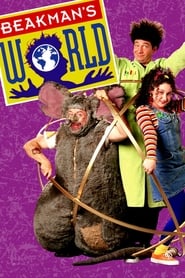
Sep 1992 - Dec 1997
8.1

| E1 | E2 | E3 | E4 | E5 | E6 | E7 | E8 | E9 | E10 | E11 | E12 | E13 | E14 | E15 | E16 | E17 | E18 | E19 | E20 | E21 | E22 | E23 | E24 | E25 | E26 | |
|---|---|---|---|---|---|---|---|---|---|---|---|---|---|---|---|---|---|---|---|---|---|---|---|---|---|---|
| S1 | ||||||||||||||||||||||||||
| S2 | ||||||||||||||||||||||||||
| S3 | ||||||||||||||||||||||||||
| S4 |
Browse episode ratings trends for Beakman's World. Simply click on the interactive rating graph to explore the best and worst of Beakman's World's 91 episodes.

S3 Ep9
9.0
11th Nov 1995
Beakman explains why islands don't float and how springs work.

S3 Ep8
9.0
4th Nov 1995
Beakman examines balance and how animals use camouflage.

S3 Ep7
8.7
28th Oct 1995
Beakman on the wonders of carbon and an interview with the young inventor Thomas Edison.

S1 Ep11
8.7
21st Nov 1992
"Boats, Beakmania & Airplanes": Beakman explores how boats float, the science of flight, and includes a fun Beakmania segment with experiments and quirky demonstrations.
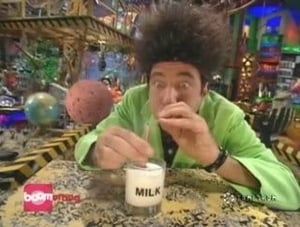
S1 Ep3
8.6
26th Sep 1992
The "Beakman's World" episode titled "Noises at Night, Beakmania & The Nose" is part of Season 1, Episode 3. In this episode, Beakman and his team dive into fun and educational experiments to explain the science behind various noises, particularly those heard at night. They explore how the human ear works, why we hear certain sounds more clearly at night, and why the sounds of the world around us change as the sun goes down.

S3 Ep5
8.5
14th Oct 1995
Beakman reveals how vacuum cleaners work and how cloth is made.

S3 Ep6
8.3
21st Oct 1995
Answers to questions about lobsters, crabs and Swiss scientist Daniel Bernoulli.
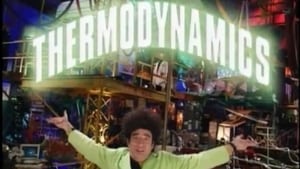
S1 Ep16
8.3
25th Dec 1992
"Vaccinations, Beakmania & Friction": Beakman explains how vaccinations work to protect the body from diseases, exploring how they boost the immune system. The episode also dives into the science of friction, showing how it affects everything from walking to car brakes. In the Beakmania segment, Beakman answers fun, quirky questions and performs experiments to demonstrate these concepts. With humor and hands-on demonstrations, the episode makes these scientific principles fun and easy to understand for kids.

S1 Ep1
8.1
12th Sep 1992
Wacky scientist Beakman and his assistant Josie, and Lester, an actor dressed as a mangy rat, answers an inquiry about where puddles go after it has rained. Although Lester suggests they are licked up by stray dogs, Beakman proceeds to explain the mysteries of rain and evaporation using a variety of household props. In the "Beak-Mania" portion of the show, Beakman attempts to answer, in rapid succession, short viewer inquiries on topics such as living prehistoric animals (the platypus), the most commonly used word in the English language and the heaviest animal in the history of the world (blue whale). Then, after a trick in which he balances a pair of forks atop a toothpick, Beakman forces Josie to reveal the question for the show's final segment, "What is snot?" Turning to volcanoes, Beakman explains the processes in the Earth's interior that create, and then discharge, molten magma. With the aid of film footage of volcanic eruptions, Beakman employs a foam rubber model of the Earth and a rubber glove to show how magma moves from deep inside the Earth and appears on the surface as lava. Finally, asked by Josie about why some volcanoes explode, Beakman uses a cherry pie to demonstrate the power, and mess, of a volcanic eruption.

S3 Ep11
8.0
25th Nov 1995
Beakman explains the difference between alligator and crocodiles, and then takes a peek at robots.
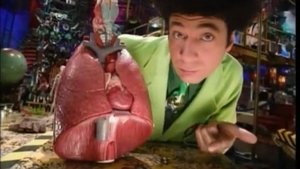
S1 Ep18
6.3
9th Jan 1993
"Lungs, Beakmania & Telephones": Beakman explains how lungs work to breathe and how oxygen travels through the body. The episode also explores the science behind telephones, demonstrating sound transmission. In Beakmania, Beakman answers quirky questions and conducts fun, educational experiments. Combining humor with science, the episode makes complex topics like respiration and communication systems fun and easy for kids to understand through interactive demonstrations.
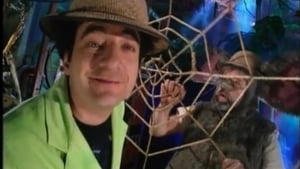
S1 Ep20
6.3
23rd Jan 1993
"Microwaves, Beakmania & Spiders": Beakman explores how microwaves work to heat food and how they affect molecules. The episode also delves into the fascinating world of spiders, explaining how they spin webs and catch prey. In Beakmania, Beakman answers quirky questions and performs fun, educational experiments. With humor and hands-on demonstrations, the episode makes complex topics like microwave energy and arachnology both entertaining and easy to understand for kids.

S1 Ep19
6.3
15th Jan 1993
"Tape Recordings, Beakmania & Force vs. Pressure": Beakman explains how tape recordings capture sound and how sound waves are stored. The episode also explores the difference between force and pressure, showing how they affect objects. In Beakmania, Beakman answers fun questions and performs quirky experiments. With humor and hands-on demonstrations, the episode makes concepts like sound recording and physics principles accessible and entertaining for kids.
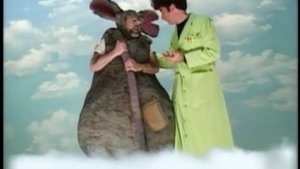
S1 Ep14
6.7
12th Dec 1992
"Scientific Method, Beakmania & Rainbows": Beakman explains the scientific method, showing how experiments are conducted step-by-step. The episode also explores how rainbows form, with fun Beakmania segments and experiments.

S3 Ep2
6.7
23rd Sep 1995
Beakman discusses the usefulness of gyroscopes and how to keep a healthy heart.
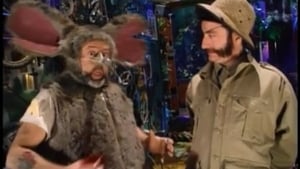
S1 Ep17
7.0
1st Jan 1993
"Fossils, Beakmania & the Human Voice": Beakman explores how fossils form and what they tell us about ancient life. The episode also dives into the science of the human voice, explaining how we produce sound. In Beakmania, Beakman answers quirky questions and performs fun experiments. With a mix of humor and hands-on demonstrations, the episode makes complex topics like paleontology and vocal mechanics accessible and entertaining for kids.

S3 Ep13
7.0
9th Dec 1995
Beakman and company look at snow and natural selection.

S1 Ep7
7.1
23rd Oct 1992
"Electricity, Beakmania & Light Bulbs": Beakman explores how electricity works, the science behind light bulbs, and includes a fun Beakmania segment with quirky experiments and facts.
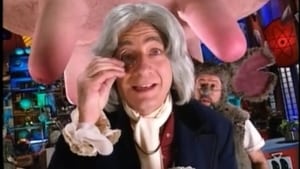
S1 Ep15
7.2
18th Dec 1992
"Vaccinations, Beakmania & Friction": Beakman explains how vaccinations work to protect the body from diseases, exploring how they boost the immune system. The episode also dives into the science of friction, showing how it affects everything from walking to car brakes. In the Beakmania segment, Beakman answers fun, quirky questions and performs experiments to demonstrate these concepts. With humor and hands-on demonstrations, the episode makes these scientific principles fun and easy to understand for kids.

S3 Ep12
7.3
2nd Dec 1995
Beakman and company look at the origins of steel and how photographs are made.

S1 Ep1
8.1
12th Sep 1992
Wacky scientist Beakman and his assistant Josie, and Lester, an actor dressed as a mangy rat, answers an inquiry about where puddles go after it has rained. Although Lester suggests they are licked up by stray dogs, Beakman proceeds to explain the mysteries of rain and evaporation using a variety of household props. In the "Beak-Mania" portion of the show, Beakman attempts to answer, in rapid succession, short viewer inquiries on topics such as living prehistoric animals (the platypus), the most commonly used word in the English language and the heaviest animal in the history of the world (blue whale). Then, after a trick in which he balances a pair of forks atop a toothpick, Beakman forces Josie to reveal the question for the show's final segment, "What is snot?" Turning to volcanoes, Beakman explains the processes in the Earth's interior that create, and then discharge, molten magma. With the aid of film footage of volcanic eruptions, Beakman employs a foam rubber model of the Earth and a rubber glove to show how magma moves from deep inside the Earth and appears on the surface as lava. Finally, asked by Josie about why some volcanoes explode, Beakman uses a cherry pie to demonstrate the power, and mess, of a volcanic eruption.

S1 Ep2
7.8
26th Sep 1992
Beakman explains the laws of gravity; Galileo shows the effects of gravity;. Sir Isaac Newton explains inertia; how a seat belt helps save lives.

S1 Ep3
8.6
26th Sep 1992
The "Beakman's World" episode titled "Noises at Night, Beakmania & The Nose" is part of Season 1, Episode 3. In this episode, Beakman and his team dive into fun and educational experiments to explain the science behind various noises, particularly those heard at night. They explore how the human ear works, why we hear certain sounds more clearly at night, and why the sounds of the world around us change as the sun goes down.

S1 Ep4
7.5
The Beakman's World episode titled "Blood, Beakmania & Dreams" is from Season 1, Episode 4. In this episode, Beakman and his team dive into the science of blood, explaining how it circulates through the body, the role it plays in keeping us alive, and the components that make up blood, such as red and white blood cells. They explore how our body uses blood to transport oxygen and nutrients, and how it helps fight infection.

S1 Ep5
7.7
10th Oct 1992
"Leaves, Beakmania & Paper": Beakman explains photosynthesis, why leaves change color, and how paper is made, alongside fun experiments and a Beakmania segment.

S1 Ep6
7.8
17th Oct 1992
"Soap, Beakmania & Auto Engines": Beakman explains how soap works, the science behind cleaning, and dives into how auto engines run, with a fun Beakmania segment filled with humor and experiments.

S1 Ep7
7.1
23rd Oct 1992
"Electricity, Beakmania & Light Bulbs": Beakman explores how electricity works, the science behind light bulbs, and includes a fun Beakmania segment with quirky experiments and facts.

S1 Ep8
7.6
31st Oct 1992
"Sound, Beakmania & Explosions": Beakman explains how sound travels, the science of explosions, and features a Beakmania segment with fun experiments and comical demonstrations.

S1 Ep9
7.7
7th Nov 1992
"Refraction, Attraction & Beakmania": Beakman explores light refraction, the science of attraction (magnetism), and includes a Beakmania segment with humorous experiments and quirky questions.

S1 Ep10
7.4
14th Nov 1992
"Levers, Beakmania & Television": Beakman explains how levers work, the science behind television, and features a fun Beakmania segment with engaging experiments and humorous antics.

S1 Ep11
8.7
21st Nov 1992
"Boats, Beakmania & Airplanes": Beakman explores how boats float, the science of flight, and includes a fun Beakmania segment with experiments and quirky demonstrations.
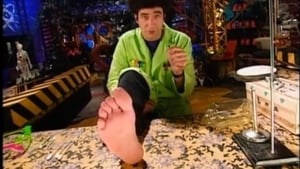
S1 Ep12
7.7
28th Nov 1992
"Bubbles, Beakmania & Feet": Beakman dives into the science of bubbles, explaining how they form, why they pop, and their surface tension. The episode also explores the science behind feet, including how they help us balance and walk. In the Beakmania segment, Beakman answers quirky questions and performs humorous experiments. The episode blends fun with science, engaging viewers with hands-on demonstrations that explain everyday phenomena in an entertaining way.

S1 Ep13
7.7
5th Dec 1992
"Microscopes, Beakmania & Healing": Beakman explains how microscopes work and how they help us see tiny things. The episode also explores the science of healing, including how our bodies repair themselves. In Beakmania, Beakman answers fun questions and does quirky experiments. The show combines science with humor, offering hands-on demonstrations and making complex concepts like cell regeneration and magnification entertaining and easy to understand for kids.

S1 Ep14
6.7
12th Dec 1992
"Scientific Method, Beakmania & Rainbows": Beakman explains the scientific method, showing how experiments are conducted step-by-step. The episode also explores how rainbows form, with fun Beakmania segments and experiments.

S1 Ep15
7.2
18th Dec 1992
"Vaccinations, Beakmania & Friction": Beakman explains how vaccinations work to protect the body from diseases, exploring how they boost the immune system. The episode also dives into the science of friction, showing how it affects everything from walking to car brakes. In the Beakmania segment, Beakman answers fun, quirky questions and performs experiments to demonstrate these concepts. With humor and hands-on demonstrations, the episode makes these scientific principles fun and easy to understand for kids.

S1 Ep16
8.3
25th Dec 1992
"Vaccinations, Beakmania & Friction": Beakman explains how vaccinations work to protect the body from diseases, exploring how they boost the immune system. The episode also dives into the science of friction, showing how it affects everything from walking to car brakes. In the Beakmania segment, Beakman answers fun, quirky questions and performs experiments to demonstrate these concepts. With humor and hands-on demonstrations, the episode makes these scientific principles fun and easy to understand for kids.

S1 Ep17
7.0
1st Jan 1993
"Fossils, Beakmania & the Human Voice": Beakman explores how fossils form and what they tell us about ancient life. The episode also dives into the science of the human voice, explaining how we produce sound. In Beakmania, Beakman answers quirky questions and performs fun experiments. With a mix of humor and hands-on demonstrations, the episode makes complex topics like paleontology and vocal mechanics accessible and entertaining for kids.

S1 Ep18
6.3
9th Jan 1993
"Lungs, Beakmania & Telephones": Beakman explains how lungs work to breathe and how oxygen travels through the body. The episode also explores the science behind telephones, demonstrating sound transmission. In Beakmania, Beakman answers quirky questions and conducts fun, educational experiments. Combining humor with science, the episode makes complex topics like respiration and communication systems fun and easy for kids to understand through interactive demonstrations.

S1 Ep19
6.3
15th Jan 1993
"Tape Recordings, Beakmania & Force vs. Pressure": Beakman explains how tape recordings capture sound and how sound waves are stored. The episode also explores the difference between force and pressure, showing how they affect objects. In Beakmania, Beakman answers fun questions and performs quirky experiments. With humor and hands-on demonstrations, the episode makes concepts like sound recording and physics principles accessible and entertaining for kids.

S1 Ep20
6.3
23rd Jan 1993
"Microwaves, Beakmania & Spiders": Beakman explores how microwaves work to heat food and how they affect molecules. The episode also delves into the fascinating world of spiders, explaining how they spin webs and catch prey. In Beakmania, Beakman answers quirky questions and performs fun, educational experiments. With humor and hands-on demonstrations, the episode makes complex topics like microwave energy and arachnology both entertaining and easy to understand for kids.
The first episode of Beakman's World aired on September 12, 1992.
The last episode of Beakman's World aired on December 06, 1997.
There are 91 episodes of Beakman's World.
There are 4 seasons of Beakman's World.
No.
Beakman's World has ended.